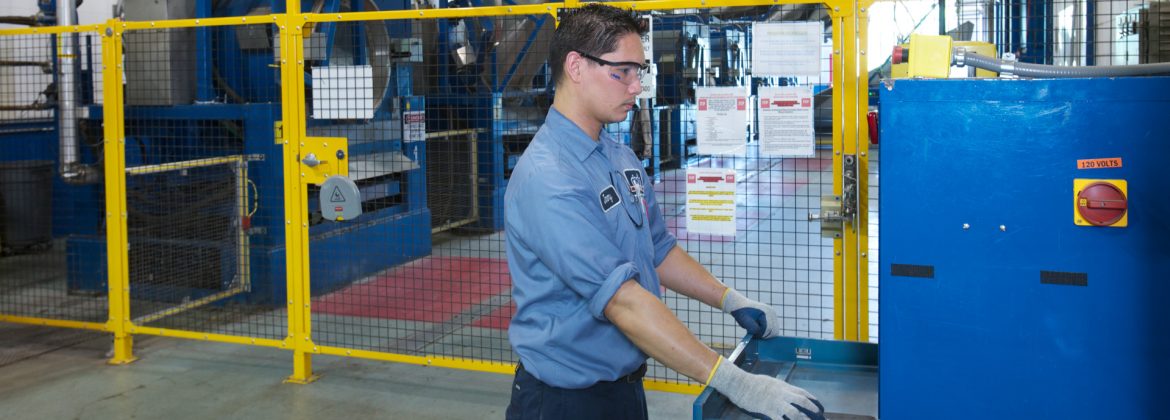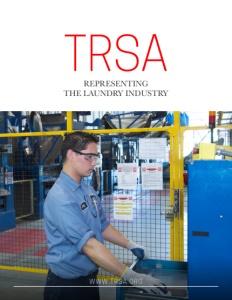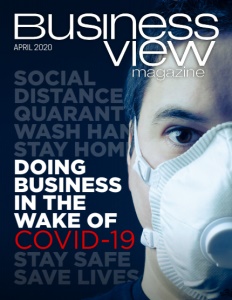TRSA
Representing the laundry industry
TRSA, the Association for the Linen, Uniform and Facility Services Industry, protects, professionalizes and expands the industry by building a stronger, safer, and more environmentally-conscious community through advocacy, certification, education, research, benchmarking, and information-sharing. Based in Alexandria, Va., serving more than 300 industry operators and their suppliers worldwide, TRSA entered 2020 devoting more resources to:
- Promoting safety and health in the industry and its customers’ facilities
- Supporting members’ efforts to solve their employment challenges
- Improving the sustainability and hygiene, as well as productivity
Benefiting from TRSA’s environment of cooperation and collaboration, members are more productive, sustainable, cleaner, and safer in supplying, laundering, and maintaining products provided to their customers, which include private- and public-sector organizations of all kinds. Most Americans benefit at least once per week from the hygiene and safety of laundered, reusable linens, uniforms, towels, mats and other products that business customers procure from the industry to enhance their image and provide clean, safe environments for their employees and customers.
Providing businesses with clean textiles has long been the industry’s fundamental purpose. Especially in the last 20 years, assuring customers that textile hygiene is maximized has become a higher priority, despite the dearth of evidence that laundry or linen practices have compromised cleanliness. But more businesses are seeking proof that the already infinitesimally small risk of such difficulty is being reduced as much as possible.
This is understandably a greater concern in healthcare, especially among infection-prevention professionals in hospitals. Rather than waiting for such sentiment to lead the U.S. government to regulate the industry, in 2007, TRSA invested in the development, launch and promotion of the Healthcare Laundry Accreditation Council (HLAC), a voluntary standard-setting organization of TRSA members and healthcare professionals. Adhering to best practices consistent with guidelines for laundry from agencies such as the federal Centers for Disease Control and Prevention (CDC) and Center for Medicare and Medicaid Services (CMS), healthcare laundries built the industry’s reputation for self-regulation.
In the years immediately following, TRSA leaders recognized that more effective risk minimization was possible by focusing on outcomes including validation and testing. Collaborating with industry operators in the European Union, TRSA members witnessed the development of an EU voluntary standard for national laundry hygiene certification programs (EN 14065). It called for such programs to require laundries to document best practices (implement quality assurance functions), rather than mandating an excess of prescriptive tactics. Germany led the way with additional requirements for testing textile samples and solid surfaces in laundry for effectiveness of laundry processing in reducing all microbiological content and removing harmful bacteria. TRSA adopted these principles in 2011 in the introduction of its new Hygienically Clean certification.
Today, more than 150 North American healthcare laundries have earned the Hygienically Clean Healthcare certification. Another nearly 100 have been certified Hygienically Clean Food Safety for service to food manufacturing and processing industries. This designation has reinforced such facilities’ commitment to the Global Food Safety Initiative (GFSI). Consistent with Hazard Analysis of Critical Control Points (HACCP) methodology, certification inspectors examine a uniform service facility’s operational flow and verify the management team has ensured that best practices prevent contamination at each step. Microbiological testing of textile samples and solid surfaces is also required.
More recently, TRSA introduced Hygienically Clean Hospitality standards for laundries serving hotels and Hygienically Clean Food Service for those serving restaurants. While these businesses perceive even less of a risk from textiles than healthcare or food processing, their high conscientiousness regarding sanitation suggests they won’t be far behind in calling for maximum risk minimization in all cleaning processes.
Concern for customers’ safety and health reflects TRSA’s longstanding emphasis on members’ own workplace safety. Training materials have been provided for decades at no additional cost to members to support their compliance with Occupational Safety and Health Administration (OSHA) requirements. More recently, video has supplemented printed material, with the latter, such as templates for developing programs to meet rules for machine lockout/tagout, handling bloodborne pathogens and confined-space work, available for downloading on www.trsa.org. To foster personal collaboration, TRSA conducts an annual Safety Summit; this year’s will be the 10th consecutive such meeting.
An annual safety survey accumulates occupational injury and illness data submitted by nearly 1,000 industry facilities and depots. The most recent report found that from 2014 to 2018, the industry experienced a 15 percent drop in total recordable injuries (TRIR rate) and a 9 percent reduction in days away from work or reassignment/transfer (DART rate). This compares favorably with all private industry, down 12.5 percent and 5.9 percent, respectively, over the same time period.
New this year, TRSA’s Safety Committee is overseeing TRSA’s new Safety & Health Certification program that will verify plant performance like OSHA’s Voluntary Protection Program, while providing benchmarking and a dashboard to recognize improvement. Development of arc flash best practices is also on the committee’s to-do list as well as determining new ways to support members in electrical safety generally. Investigating accidents/incidents, avoiding complacency, and ensuring contractor safety are other areas of interest.
Staffing the industry’s workplaces presents another challenge for linen and uniform services. With unemployment expected to grow marginally (3.6 percent to 3.7 percent), they face continued difficulties finding and keeping staff. In response, TRSA is cultivating additional education programs for their supervisors, managers, and executives, particularly for developing an industry career path of ongoing professional development and recognition. These programs build the industry’s job candidate pool, aid operators’ development of policies and procedures for hiring, support on-boarding staff, and improve engagement in laundry workplaces.
At the core of such success is the industry’s virtue of building employees’ skills at work throughout their tenure. Communicating this to them begins with the recruiting of high school students that promotes the industry as a viable and rewarding long-term career choice because of advancement opportunity. TRSA is developing self-study, on-demand, and in-person training and development that establishes a clear career development path for advancement increasingly fostered through formal recognition such as TRSA certificate programs for production, maintenance, safety, and route management.
More job candidates are learning that when they are hired, their skills will be assessed to place them in positions they are best equipped to handle. This builds their confidence that they can advance. Employers benefit from placing new hires properly (increases productivity) while reducing on-boarding time and expense. New management hires whose skills are not a perfect match for a position, but they are fairly well qualified for, receive relevant, accessible training and onboarding content.
More use of training videos is anticipated and TRSA is expanding its role as a hub of knowledge and information-sharing, cultivating a culture of learning and recognition amongst its members. TRSA will work with its volunteer leaders to develop short, role-playing videos for supervisors to facilitate interactive, plant-based training. These “micro learning” initiatives minimize time away from the production line and offer industry-specific training for supervisors and managers focusing on “soft skills” such as conflict resolution, coaching, and employee evaluation. All these efforts elevate the industry’s ability to recruit, assess, train and retain the best, more engaged talent.
This vision emerged from the input of more than 200 individuals who participated in 2019 under the auspices of the TRSA Education Committee in benchmarking interviews, focus group discussions, and a survey. Also examined were organizations in other industries with effective education portfolios aimed to move “front-line/production” workers into supervisory and managerial positions. This revealed success by associations that leveraged partnerships for funding and content to emphasize the importance of elevating the industry and building out the candidate pipeline. TRSA’s Certified Professional Laundry Management (CPLM) credential identifies the necessary skills and knowledge through extensive job analysis and validates candidate’s acumen across production and management. The CPLM designation ensures a set of knowledge and skills, demonstrated a commitment by both the employee and company to develop individuals’ increasing engagement and retention.
As one TRSA research participant noted regarding current industry practices, “We promote an individual when someone is reaching 100 percent of their production target, but that’s the wrong reason. If there were a formalized program to prepare someone to go into that supervisory role, that would be a benefit for the whole industry. It’s good for retention for people to see there’s upward mobility in that you can be promoted from the inside.”
TRSA’s emerging Core Curriculum Certificate Program consists of online modules and testing for skill development. The Production Management Certificate program is now available online. To develop its Maintenance Management counterpart, a Maintenance Manager Job Analysis Advisory Task Force has met. Culled from graduates and faculty of TRSA’s Maintenance Management Institute (MMI), this group is working to identify and gather resources, develop surveys and guide the overall process of documenting the maintenance manager’s roles, responsibilities, skills, tasks, and knowledge.
Identifying, recruiting and retaining maintenance personnel, particularly skilled, knowledgeable managers, is one of the industry’s most troubling issues. Through the task force’s work on the certificate program and other assessment tools, TRSA is assisting companies in developing the skill sets and improving retention of these valuable employees.
While TRSA emphasizes finding good people, it remains a high priority for the association to support operators in reducing labor requirements through automation. Members open their laundries to each other at TRSA events such as conferences focused on sharing techniques for serving customers in various industries, including food and beverage (restaurants), healthcare (hospitals, outpatient facilities, long-term care), hospitality (hotels), and industrial (all other). Typically, the first three are largely linen flatwork and garment customers; the latter uses the industry’s customized uniforms.
Like the TRSA approach to certification, information-sharing with European operators has been especially valuable. Given that region’s decades-long difficulties minimizing labor costs, linen and uniform service operators there have placed high priority on automating functions that might otherwise be accomplish manually. In the past decade, TRSA has facilitated plant visits at the same time as laundry trade shows in Italy and Germany and conducted a standalone tour in England. This continues in 2020 with a different route through Germany following the Texcare International show there in June.
Another facility type has been added to this repertoire: visits to plants that manufacture equipment and supplies for the industry, as well as manufacturers of consumer products. In Germany, tour participants will see a Volkswagen plant. This expansion reflects TRSA’s commitment to building a global community for industry operators willing to put paradigms aside and consider new tactics to tackle the challenges of producing linen, uniform, and facility services wherever they operate.
AT A GLANCE
WHO: TRSA
WHAT: A trade association representing companies that supply and launder linens and uniforms
WHERE: Alexandria, Virginia
WEBSITE: www.trsa.org



